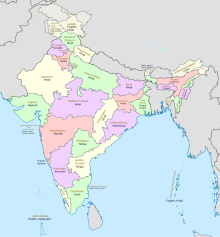Languages of India
There is national language in India.[1][2][3] There are various official languages in India at the state/territory level. However, 343(1) of the Indian constitution specifically mentions that, "The official language of the Union shall be Hindi in Devanagari script. The form of numerals to be used for the official purposes of the Union shall be the international form of Indian numerals."[3] The business in Indian parliament can only be transacted in Hindi or in English. English is allowed to be used in official purposes such as parliamentary proceedings, judiciary, communications between the Central Government and a State Government.
| Part of a series on | |
|---|---|
| |
| Constitutionally recognised languages of India | |
| Category | |
| Scheduled Languages | |
|
A
| |
| Related | |
|
Official languages of India
|

The Constitution lists 22 scheduled languages of India: Assamese, Bengali, Bodo, Dogri, Gujarati, Hindi, Kannada, Kashmiri, Konkani, Maithili, Malayalam, Manipuri, Marathi, Nepali, Odia, Punjabi, Sanskrit, Santali, Sindhi, Tamil, Telugu, and Urdu.[4]
Related pages
changeReferences
change- ↑ PTI (25 January 2010). "Hindi, not a national language: Court". The Hindu. Retrieved 20 November 2018.
- ↑ "Constitutional Provisions: Official Language Related Part-17 of The Constitution Of India". Department of Official Language, Government of India. Retrieved 1 July 2015.
- ↑ 3.0 3.1 "THE OFFICIAL LANGUAGE POLICY OF THE UNION | Department of Official Language | Ministry of Home Affairs | GoI". rajbhasha.nic.in. Retrieved 20 March 2019.
- ↑ "India", The World Factbook, Central Intelligence Agency, 11 April 2023, retrieved 15 April 2023
Other websites
change- Kulkarni-Joshi, Sonal. "Linguistic history and language diversity in India: Views and counterviews." Journal of Biosciences 44 (2019): 1-10.
